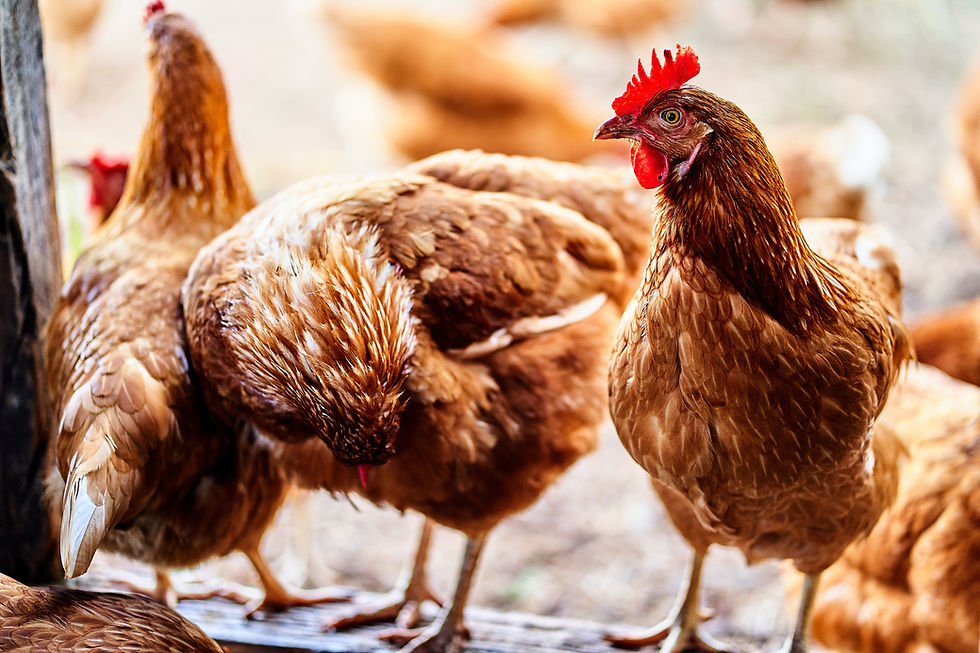Backyard Chickens 101: A Beginner’s Guide to Raising Happy, Healthy Hens
- rachaelwade28
- Mar 24, 2025
- 4 min read
Updated: Mar 30, 2025

Raising backyard chickens is a fun and rewarding way to connect with nature, enjoy fresh eggs, and embrace a more sustainable lifestyle. With egg prices soaring and concerns over food security growing, more people are turning to backyard chicken keeping as a way to take control of their food supply and reduce grocery costs. Whether you dream of a small flock or a thriving homestead, this beginner’s guide will walk you through everything you need to know to get started with backyard chickens.
1. Why Keep Backyard Chickens?
Keeping chickens isn’t just about farm-fresh eggs—it’s about sustainability, self-sufficiency, and even companionship. Here are some great reasons to start your own flock:
Fresh, organic eggs with better nutrition than store-bought ones.
Natural pest control as chickens eat insects and weeds.
Less food waste since chickens love table scraps.
Free fertilizer from their nutrient-rich manure.
Fun, quirky pets that add charm to your backyard.
2. Choosing the Right Chicken Breeds
Not all chickens are the same. Some are better for eggs, others for meat, and some are just friendly backyard companions. Here are a few beginner-friendly breeds:
Best Egg Layers: Rhode Island Red, Leghorn, Australorp, Orpington
Kid-Friendly & Friendly Breeds: Buff Orpington, Silkie, Plymouth Rock
Cold-Hardy Chickens: Wyandotte, Sussex, Brahma
Heat-Tolerant Chickens: Leghorn, Andalusian, Minorca
Choose breeds based on your climate, egg production needs, and whether you want friendly, docile birds.
3. Setting Up Your Chicken Coop
Your chickens will need a safe, cozy coop to protect them from weather and predators. Here’s what to include:
Space Requirements – Provide 2-3 square feet per chicken inside the coop and 8-10 square feet per chicken in the run for happy, stress-free birds.
Roosting Bars – Chickens love to sleep off the ground. Install sturdy roosting bars inside the coop.
Nesting Boxes – Provide one nesting box per 3-4 hens for egg-laying. Line them with straw or pine shavings.
Ventilation – Proper airflow prevents moisture buildup and respiratory issues. Add vents near the top of the coop.
Predator Protection – Use hardware cloth (not chicken wire) to secure the coop and run from raccoons, foxes, and hawks.
4. Feeding & Watering Your Chickens
Chickens need a balanced diet to stay healthy and lay eggs consistently.
What to Feed:
Layer Feed – A complete feed with the right nutrients for egg-laying hens.
Grit – Helps chickens digest food properly.
Calcium (Oyster Shells) – Strengthens eggshells and prevents weak or broken eggs.
Healthy Treats – Fruits, veggies, grains, and mealworms are great snacks (avoid avocado, onions, and chocolate).
Water: Fresh, clean water is essential. Use a heated waterer in winter to prevent freezing.
I have tried many feeders and waterers over the years and this is the best set that I have found. Using this brand I've been able to keep my chicken's food and water very clean - which you will find out is a struggle when owning chickens.
5. Daily & Weekly Chicken Care Routine
Daily:
Feed and provide fresh water.
Check for eggs in nesting boxes.
Do a quick health check (look for signs of illness or injury).
Weekly:
Clean the coop and refresh bedding.
Check the food and water supply.
Inspect for any signs of pests or predators.
Monthly:
Deep clean the coop with a non-toxic cleaner.
Check for coop repairs and predator-proofing.
6. Common Health Issues & Prevention
Healthy chickens are happy chickens. Watch for these common issues:
Mites & Lice – Prevent by dusting with food-grade diatomaceous earth and keeping the coop clean.
Egg Binding – Happens when a hen can’t lay an egg. Provide calcium and a warm bath to help.
Respiratory Illness – Ensure proper coop ventilation and avoid damp conditions.
Molting (Feather Loss) – A natural process where chickens regrow feathers, usually in fall.
7. Collecting & Storing Fresh Eggs
How to Collect Eggs:
Check nesting boxes daily to prevent eggs from cracking or getting dirty.
Gently wipe off dirt, but don’t wash eggs unless needed—natural bloom protects freshness.
How to Store Eggs:
Unwashed eggs can stay on the counter for up to two weeks.
Refrigerated eggs (washed or unwashed) stay fresh for three or more months.
8. Letting Your Chickens Free-Range
Letting your chickens roam outside the coop can provide extra nutrition and enrichment. Just be mindful of:
Predator risks – Supervise free-ranging and provide hiding spots.
Garden damage – Chickens love to dig, so fence off delicate plants.
Secure the coop at night – Always lock up your flock at dusk.
9. Understanding Chicken Behavior
Backyard chickens have their own personalities and social dynamics.
Pecking Order – Chickens establish a social hierarchy, and occasional squabbles are normal.
Dust Bathing – They roll in the dirt to clean their feathers and stay parasite-free.
Talking Chickens – Clucking and cooing are normal, but loud squawking may signal distress or egg-laying excitement.
10. Getting Your First Flock
Ready to bring home your chickens? Here’s what you’ll need:
Coop & run setup
Feeder & waterer
Layer feed & grit
Nesting boxes with bedding
A safe, predator-proof environment
Start with three to five hens to keep things manageable. Consider getting pullets (young hens) for easier care, or start with chicks if you’re ready for the extra work.
Final Thoughts
Raising backyard chickens is an exciting, rewarding way to live more sustainably and enjoy fresh eggs right from your backyard. With food costs rising, having your own flock can provide security, savings, and peace of mind. With a little preparation and care, your chickens will thrive, bringing joy and benefits to your homestead or urban oasis.
Are you ready to start your chicken-keeping journey? Let me know in the comments what breed you’re thinking of getting!
Happy chicken-keeping!






Comments